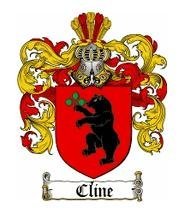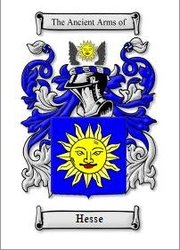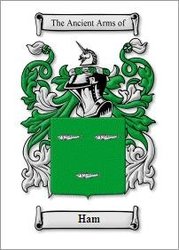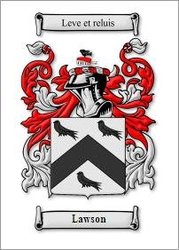CLINE:
This is one of the most famous of all surnames of Germanic origins. It is a nickname, and is recorded in some fifty spellings ranging from Klein, Kleyn, and Cline, to De Cleyne, Kleinermann, and Klejna, and with many compounds such as Kleinbaum and Kleinhandler. However spelt the origination is pre 7th century a.d., and the derivation is from the words klein or kleyne meaning "small". In ancient times before the introduction of surnames in about the 12th century, nicknames, particulary those of endearment were very popular. In this case the word was probably applied to the youngest member of a family, although it could also have applied to one of small stature or even the reverse! Pre-medieval humour was both robust and personalised, so "Klein" may on occasion have been a nickname for a large person! The surname is one of the first ever recorded anywhere, and early examples taken from the authentic German charters and registers of the period, confirm its popularity. These include Walthem der Kleine of Kassel in the year 1209, Kounrad Claineman of Oberschwaben in 1283, Conrad Klainer of Friedingen in 1424, and Johan Klainhain of Konstanz in 1469. The first known recording of the surname anywhere in the world is probably that of Herolt der Kleine from Wurzburg, Germany, in the charters of that city for the year 1185. Surnames throughout the world have continued to "develop" over the centuries. This often leads to spellings far from their original form.
HAMM:
HAM was derived from the Old English HAMM - dweller on the flat low lying land by a stream. Local names usually denoted where a man held his land and indicated where he actually lived. It was also a baptismal name 'the son of Hamo or Hamme', an ancient although now long forgotten personal name. Early records of the name mention Robert de la Hamme of the County of Sussex in 1275. Johannes Hamme of Yorkshire was listed in the Yorkshire Poll Tax of 1379. Jonathan Ham was baptised at St. James's, Clerkenwell, London in 1699. The names of habitation are derived from pre-existing names denoting towns, villages, farmsteads or other named habitations. Other classes of local names include those derived from the names of rivers, individual houses with signs on them, regions and in fact whole countries. As a general rule, the further someone travelled from his place of origin, the broader the designation. Someone who stayed at home might be known by the name of his farm or locality in the parish; someone who moved to another town might be known by the name of his village; while someone who moved to another county could acquire the name of the county or region from which he originated.
The associated arms are recorded in Sir Bernard Burkes General Armory. Ulster King of Arms in 1884.
LAWSON:
This is a surname of truly ancient origins. It originates in the Holy Land in so far as the etymology of the surname is concerned, being 'brought back' to England and Scotland as 'Lawrence' by the 12th century crusaders. In its earliest form as 'Law', it was a nickname of endearment, and as such had great popularity in the medieval period. The earliest origination of the name at all is pre-Christian, being derived from Laurentum, the town in Italy famous for its laurel trees. For reasons unclear, Lawson is very much a north country surname. There are no less than seventeen coats of arms, all but one were granted to northern nameholders, and all seem to be associated with the Lawson family of Brough Hall, Yorkshire, whose origins are traceable back to the time of Richard 111, and 'The War of the Roses'. Their coat of arms, which is believed to be the original grant, has the blazon of a silver field, charged with a chevron between three martlets, all black. These arms suggest a loyal person who lived by the sword, having no estates to support him. However as in later years the family addresses included Nesham Abbey, Durham, Longhirst in Cumberland, Boroughbridge Hall, Cairnmuir in Peebles, Scotland, etc, one has to assume that the family fortunes improved over the centuries. Early recordings include Henry Laweson in the Poll Tax Rolls of Yorkshire for the year 1379, whilst one of the very earliest settlers into the New American colony of Virginia Christopher Lawson, recorded as 'living at James Cittie' in that state, on February 23rd 1624. The first recorded spelling of the family name is shown to be that of Richard Lawisson, which was dated 1327, in the Subsidy Rolls of the county of Cumberland, during the reign of King Edward 111, known as 'The father of the Navy', 1327 -1377. Surnames became necessary when governments introduced personal taxation. In England this was known as Poll Tax. Throughout the centuries, surnames in every country have continued to "develop" often leading to astonishing variants of the original spelling.
HESSE:
Recorded in several forms including Hess, Hesse, Hesser, Hessing and Hessung, this is a famous Germanic surname. It is arguably both tribal and residential, originating from the pre 10th century a.d. It is believed to have originally described people who came from the region known as Hesse. The translation of this name is the 'hooded people', but whether this referred to people who made hoods and other garments such as coats and cloaks, or whether they habitually worse such clothing, or whether 'Hesse' is a transposed meaning, perhaps for warriors who wore a particular type of helmet like a hood, is uncertain. Most researchers have their own views, and all are different! In our view it is impossible, to ascribe with total accuracy, meanings to 'names' that were created a thousand years or more ago. In effect only those that were there at the time could possibly know with complete surety, what was actually meant. However the surname in its various forms has prospered. It is one of the earliest German surnames to be recorded anywhere, as few existed at all before the 13th century. These recordings include Godescalus Hesso of Koln in the charters of that city in the year 1180, Bentz Hessing of Magstadt, Boblingen, in 1350, and Martin Hesser of Roth, Leutkirch, in 1420.





